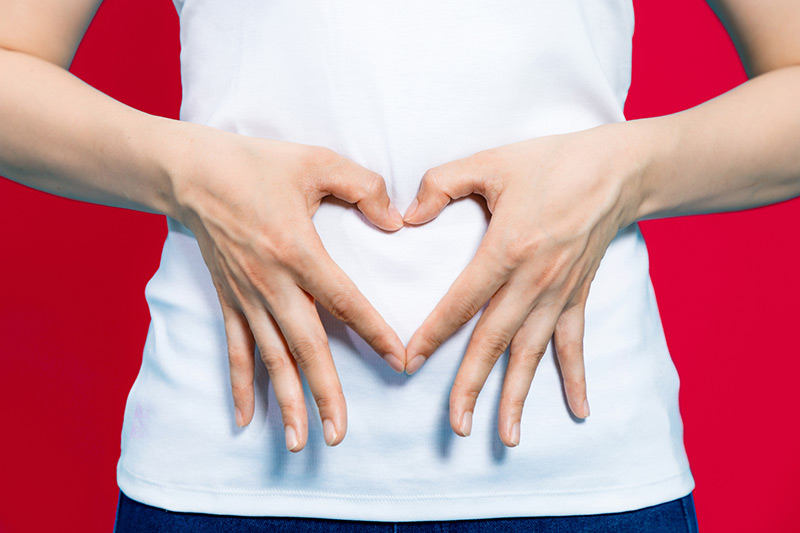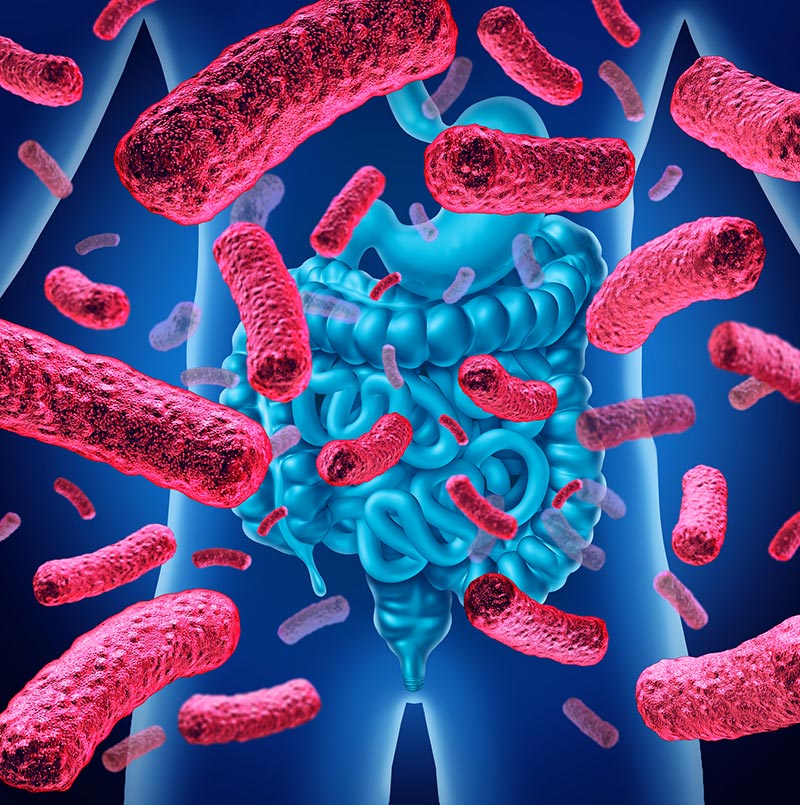Inside of your digestive tract an enormous number of bacteria live. These single-celled organisms have colonized all surfaces and cavities of your body and exist there happily. Because we have been trained to view bacteria as the enemy, the fact 100 trillion bacteria that live in your gut may alarm you. However, our internal bacteria are critical to our health, so critical, in fact, that we cannot survive or even be healthy without them.
There is an Ecosystem in Your Gut
Internal bacteria are fundamental to the development of our immune system. They also help break down our food and create nutrients that we need for good health. And they play a large role in whether or not we experience diarrhea, constipation, gas, bloating, abdominal pain, or IBS.
The massive surface of our intestines provides everything bacteria need for life including a warm space, moisture, and nutrients. The bacteria inside us form a teeming, busy ecosystem. This ecosystem functions like any other ecosystem, and changing or harming one species will have repercussions on the other species and on the host itself.
While we are used to thinking of the earth’s ecosystems in this way, it may seem strange that these same principles govern our digestive environment. This environment is all too easily altered, especially in our world of antibiotics, acid blockers, and any other foreign substance that is ingested. And many people suffer from IBS due to a microbial imbalance in their digestive tract.
Three Major Categories of Bacteria
There are basically three types of micro-organisms living in our intestines – good bacteria, bad bacteria yeast/parasites, and really bad bacteria/parasites.
A deficiency of good bacteria and/or the presence of bad and ugly bacteria, yeast (Candida,) or parasites will cause a variety of digestive problems, including abdominal pain, diarrhea, constipation, and even nutritional deficiencies. They can also cause a large number of symptoms beyond the digestive tract.
The Good Bacteria
The good bacteria include species and strains that we evolved with, like acidophilus and Bifidobacterium. These are an essential part of our digestive system and we would not survive without them. They help us to digest food by producing enzymes, manufacture some of the essential nutrients that we need to live, assist in the development of our immune system, and prevent infection by occupying and defending the space in the intestines that unwelcome organisms would thrive in, if they could.
The Bad and Ugly Bacteria
The bad bacteria and other microorganisms include many species and strains that don’t help us, but rather upset the balance. These can include bacteria that crowd out the species we need, or the overgrowth of bacteria or yeast.
What makes a bad bacteria bad? The worst bacteria, the ugly, either directly destroy tissue by feeding upon it or produce a toxin that destroys tissue. Other bacteria do not digest food well, or are poor fermenters of food, creating IBS symptoms like gas and diarrhea.
Some species of yeast and bacteria are bad simply because they take up space, crowding out the good bacteria. This deprives your body of all the health-giving benefits that friendly bacteria provide, resulting in the poor digestion of food and the poor absorption of nutrients.
At very low populations, these bad bacteria may be considered relatively normal flora in the intestinal tract. However, being normal doesn’t make them good.
The bad bacteria, which include the Enterobacteriaceae family of:
- Citrobacter
- Enterobacter
- Klebsiella
- Proteus
- Serratia
- Pseudomonas
- Staphylococcus
Each has been documented as causing IBS-type symptoms, and they often need to be eliminated. Unfortunately, most doctors rarely test for them, nor would they recognize them as a problem.
If bad bacteria have managed to increase its population and gain territory in your intestinal tract, you may experience gas, bloating, abdominal pain, or loose stools. You’re probably not dying from these bacteria, but they can make you very uncomfortable.
You may be surprised to learn that another bacteria considered normal flora is a strain of E. coli. Due to well-publicized cases of E. coli outbreaks, the name itself now seems scary. Some types of E. coli are scary, but the strain of E. coli normally found in the intestines is not the toxic strain that causes bloody diarrhea and other symptoms. In fact, we all have E. coli living in our intestines.
If the bad bacteria weren’t enough, there are also the ugly bacteria. The ugly bacteria are never regarded as normal flora within the body. They are not usually considered to be causes of IBS, but they do cause severe, often life-threatening, conditions.
Ugly bacteria include:
- Clostridium difficile
- Salmonella
- Shigella
- Yersinia
- Vibrio cholerae
- Campylobacter
- Certain strains of E. coli
The symptoms of these bacterial infections usually include severe watery and often bloody diarrhea.
Other symptoms of ugly bacteria may include:
- Vomiting
- Muscular cramps
- Dehydration
- Permanent intestinal damage
In short, these ugly bacteria and the symptoms they cause are nothing to fool around with. If untreated, infections of ugly bacteria may even cause death. Luckily, the medical community is generally good at identifying and treating these kinds of bacterial infestations.
Parasites
Parasites like Giardia, Cryptosporidium, and even worms, can be contracted through contact with pets, infected persons, or contaminated food or water. These can cause a whole host of symptoms, but may only be evident from the symptoms that define IBS like altered stool habits and abdominal pain or discomfort.
As world gets smaller due to the increased importation of foods and the ease of international travel, parasites are increasingly more common in western society. Some, like Giardia and Cryptosporidium, are already on the radar of your doctor and are likely to tested for when you see you doctor with diarrhea.
Other types of parasites can also cause diarrhea or gas, such as Blastocystis hominis and Dientamoeba fragilis, but you doctor is unlikely to test for them or even know to treat them.
A thorough evaluation of parasites will include testing for the following:
- Blastocystis hominis
- Dientamoeba fragilis
- Cryptosporidium
- Giardia
- Cyclospora
- Endolimax nana
- Entamoeba hystolytica
- Tapeworms
- Hookworms
- Roundworms
- Whipworms
Antibiotics Can Cause Bacteria Growth
While some bad bacteria and yeast may be present in very small numbers in healthy people, excessive amounts of these microorganisms can upset this delicate ecosystem and trigger all kinds of negative effects. Since the advent of antibiotics, it is quite common for people to use wide-spectrum anti-biotics and unwittingly kill off many of the good bacteria that they need, allowing bad microorganisms to ‘claim more turf’ and upset the balance in this ecosystem. This is a common cause of IBS.
What is SIBO?
SIBO stands for small intestine bacterial overgrowth. A bacterial overgrowth of the small intestine is the concept that the wrong kind of bacteria have colonized and over-run the small intestine. This means that bad bacteria other than have set up shop and are wreaking havoc with your ability to properly digest your food.
Some in the IBS medical community view SIBO as the primary cause of irritable bowel syndrome, and use special testing and the antibiotics Xifaximin or Rifaximin, which work only in the digestive tract, to treat it.
In order to figure out whether or not you are suffering from SIBO, a physician may have you undergo a breath test. Breath testing is not a direct measurement of the bacteria, but an indirect measurement. Breath testing is based on the concept that when you are given something to digest, you will produce more hydrogen or methane in your breath if you have bad bacteria in your digestive tract.
There is some question about the research into breath testing. Much of the published research into this type of testing was done by one physician who had a financial relationship with a pharmaceutical company that makes the antibiotics that treat SIBO, posing a potential conflict of interest.
Interesting, the link between the components of your breath and the type of bacteria in your gut has never been directly proven. There is research indicating that having the gases at increased levels in your breath does not always indicate bacteriological imbalance and no one has actually measured the bacteria in the gut and compared it to the types and amount of gasses in your breath.
At the IBS Treatment Center, we examine and test for hundreds of variables, not just one. We find that some people are suffering from a bacterial overgrowth, but that it is far more likely that someone with digestive problems is suffering from one of the many other causes of IBS, or a combination of SIBO and other causes of IBS.
What is Bacteria Food Poisoning?
Classic food poisoning is when you eat something bad and get sick for a couple of days, but then you get better and all is well. However, I sometimes see patients who seem to continually develop bacterial overgrowths or infections that are significantly impacting their digestive health. We will treat one problem and they will feel better for a while, only to have another bacterial overgrowth develop shortly thereafter.
This becomes very frustrating for the patient. Why does this happen? In many cases people are eating foods that just plain aren’t fresh enough to eat, or they are using homemade probiotic products or foods.
This is particularly problematic in people who save food too long. Refrigerators are great, but they can’t keep food fresh forever. The fact is, when food goes bad, or even starts to go bad, it contains bacteria and yeast that, when ingested, must be killed off by the digestive tract. Sometimes it takes a day or two and then we feel better. But sometimes it can’t be killed off, and when our digestion is already weakened and compromised, it may prevent us from recovering from a problem that we continue to create.
Gastrointestinal Infections Have a Link to IBS
Solving digestive problems is often like finding the pieces to a puzzle. There is usually more than one thing negatively impacting that digestive system, and then the cumulative effect of these things eventually causes symptoms. In our experience the reason that many people with GI infections develop IBS is because those people have other factors that were already weakening their digestive tract prior to their infection.
The infection was the straw that broke the camel’s back so to speak. Their GI tract couldn’t bounce back from the infection because there are other factors at play, such as food allergies, yeast, or deficiencies in good bacteria.
Until they gain a better understanding these other pieces to their digestive puzzle, they will not heal.
DNA Testing for Bacteria in Your Digestive Tract
DNA testing is far superior to all previous tests that assessed the presence or absence of microbes in the digestive tract and is what we do at the IBS Treatment .
In the past, bacteria and yeast had to be grown or cultured on a Petri dish, and parasites and yeast were looked for under the microscope. These standard tests do not cover the wealth of bacteria and yeast whose presence or absence can lead to IBS and related digestive problems.
DNA testing will demonstrate the amount of all friendly bacteria, unfriendly bacteria, and yeast growing in your digestive tract. It also includes the presence of all forms of parasites. It is far more comprehensive than standard stool tests which typically only measure the presence of a small number of parasites, or the ugly bacteria that cause potentially life-threatening bloody diarrhea.
The DNA test is quite simple for you. When you visit the IBS Treatment Center for your first appointment, you will be provided with the appropriate sample collection kit to take home with you. You then mail the kit directly to the lab from your house. When we get the results, we will discuss treatment options to reduce your IBS symptoms and make you feel better.


